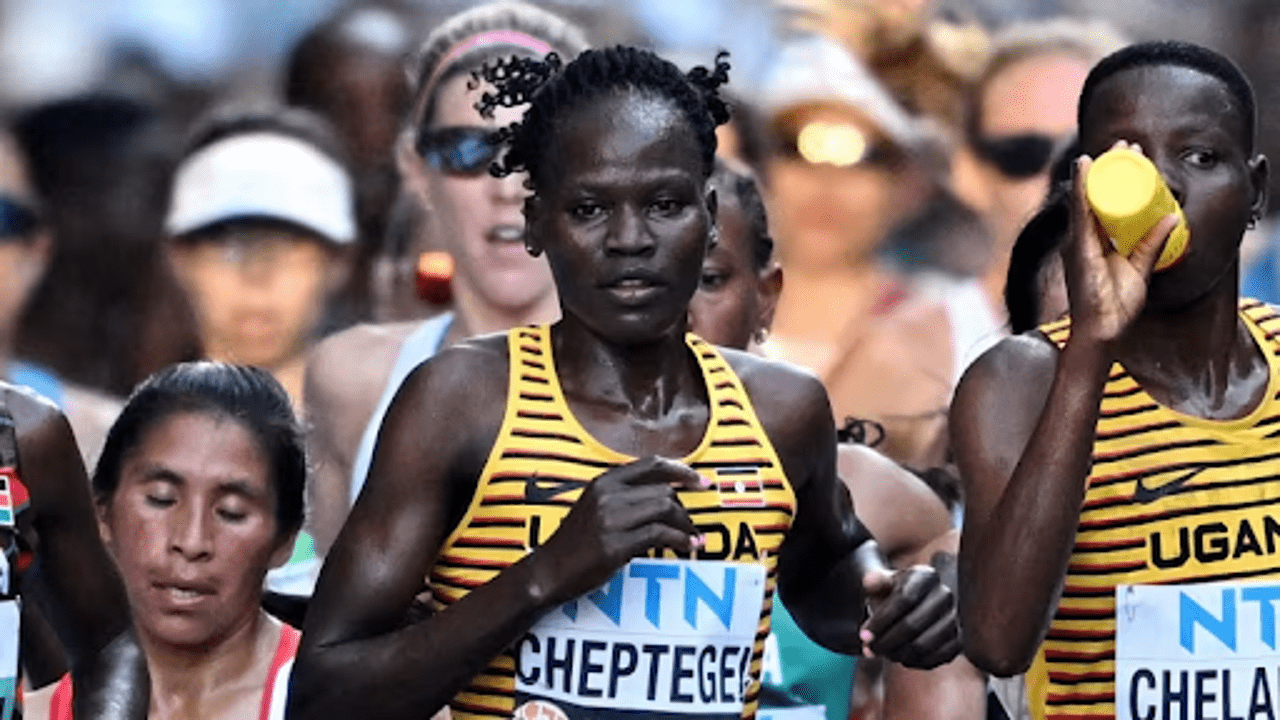
Rebecca Cheptegei, a Ugandan athlete who competed in a marathon in Budapest, Hungary in 2023, tragically passed away after being set on fire at her home in Kenya. Authorities suspect her ex-boyfriend is responsible for the incident. (Dylan Martinez/Reuters)
The tragic death of Ugandan Olympic runner Rebecca Cheptegei has left many, including her fellow athlete and advocate Joan Chelimo Melly, wondering if they could have done something to prevent it. The 33-year-old athlete and mother of two died after being doused in gasoline and set on fire at her home in Endebess, Kenya. The main suspect in this horrific incident is her ex-boyfriend, according to police reports.
Chelimo Melly, who met Cheptegei just a month ago during the 2024 Summer Olympics in Paris, was devastated by the news. She regrets not knowing what Cheptegei was going through and not being able to help. This latest case highlights a troubling pattern of violence against female athletes in Kenya, a country grappling with what advocates are calling an epidemic of gender-based violence.
Cheptegei's tragic death is not an isolated case. She is the third elite female athlete in Kenya to die under similar circumstances since 2021. Advocates believe that successful female athletes are often targeted because they break traditional gender norms and may also be vulnerable to financial exploitation. Zaina Kombo from Amnesty International Kenya expressed the urgency of the situation, emphasizing that society is failing to protect women from such violence.
Police reports indicate that Cheptegei’s ex-boyfriend, Dickson Ndiema, bought gasoline and attacked her during an argument. Although he was also burned and is currently in the hospital, he has not yet been charged. This incident is reminiscent of the murder of another Kenyan Olympic runner, Agnes Jebet Tirop, who was stabbed to death by her husband in 2021. Her case, along with others like it, inspired Chelimo Melly to co-found Tirop's Angels, an organization focused on preventing gender-based violence in Kenya.
Tirop's Angels travels to various communities, educating young women and girls on the warning signs of domestic abuse and how to seek help. The organization also advocates for better protection laws for women in Kenya. Chelimo Melly is proud of the lives they’ve saved, but cases like Cheptegei’s murder serve as a reminder that there is still a long way to go.
The danger for female athletes goes beyond physical harm. Many of them are targeted because of their financial success. Chelimo Melly’s organization also works on financial literacy programs, ensuring that female athletes have control over their earnings and are not exploited by their partners.
Unfortunately, the problem of gender-based violence is not limited to athletes. It is a widespread issue in Kenya, with the organization Femicide Count Kenya recording 152 killings of women in 2023, the highest since they began tracking the numbers in 2018. Government data from 2022 revealed that nearly 34% of Kenyan women aged 15 to 49 have experienced physical violence, with married women being particularly vulnerable.
For Kenyan women like Moureen Atieno Omolo, the issue hits close to home. Omolo was married off at 15 and endured years of abuse before her husband attacked her, gouging out her eye and threatening to kill their children. She eventually left him and pursued legal action, but the memories of her violent marriage resurfaced when she heard about Cheptegei’s death.
Cheptegei’s father, Joseph Cheptegei, is calling for justice, claiming that he had reported his daughter’s ex-boyfriend to the police, but no action was taken. He fears that the suspect could escape justice, as has happened in other similar cases.
This issue of accountability is something that deeply troubles Chelimo Melly. She pointed out that many perpetrators of gender-based violence in Kenya remain free, even after committing murder. The lack of justice only deepens the pain for the victims' families and friends.
Chelimo Melly continues to reflect on her brief encounter with Cheptegei. She recalls how the runner seemed excited and happy to be competing in her first Olympic Games. Now, she wishes she had known more and had been able to do something to save her.















